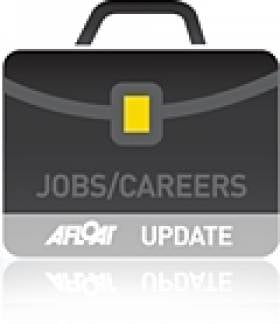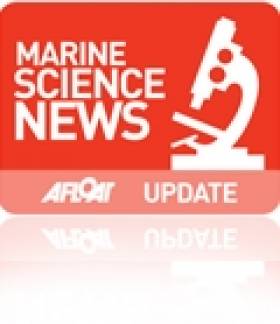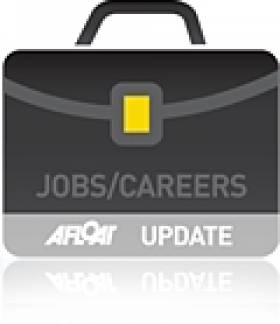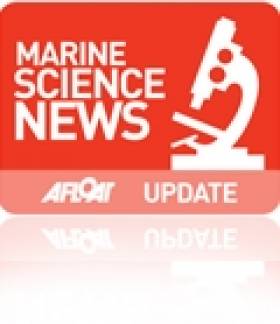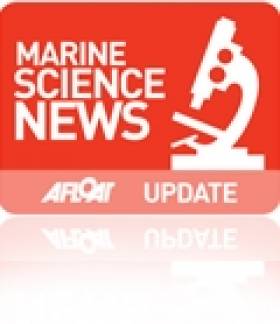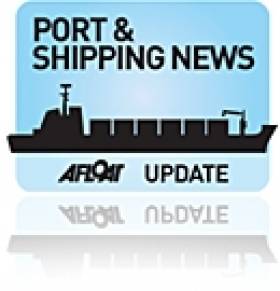Displaying items by tag: Marine Institute
Cross-Cutting Marine Opportunities in EU Funding For Research & Business
#MarineScience - The Marine Institute is hosting a one-day event for marine researchers and SMEs looking at cross-cutting opportunities in Horizon 2020 and the Interreg Atlantic Area Programme.
The first part of the day, on Thursday 7 January 2016 from 9.30am to 5.30pm, comprises a half-day course delivered by Dr Seán McCarthy on how to write a competitive proposal for Horizon 2020.
The aim of this course is to train researchers, research managers and research support services in writing professional and competitive proposals for the 'blue growth' programme.
It will describe the relevance of Horizon 2020 to EU policies, and identify common problems in proposal writing and the success criteria for proposals.
The course provides tips on how to collect information, how to select strategic partners and how to avoid duplication in proposal writing. The final section describes a strategy for proposal writing.
Later, Michael O'Brien of the North & Western Regional Assembly will hold an information session on the Interreg Atlantic programme.
This programme area is rich in maritime heritage and marine resources and boasts a strong Atlantic cultural identity. The area is also challenged by ongoing deficits in innovation and SME competitiveness capacity as well as environmental threats including climate change and threats to the biodiversity of the Atlantic area.
The agreed Programme Priorities respond to these challenges and will furthermore exploit opportunities in niche areas such as green growth, renewable energies and eco-Innovation.
The eligible priorities for the 2014-2020 programme period are:
- Stimulating innovation and competitiveness.
- Fostering resource efficiency.
- Strengthening the territory's resilience to risks of natural, climate and human origin.
- Enhancing biodiversity and the natural and cultural assets.
In the afternoon there will be opportunities for one-on-one advisory meetings with national contact points. Meeting rooms will also be available for breakout sessions if required.
For more information on the day and how to attend, visit the Marine Institute website HERE.
Transition Year Students Visit Marine Institute
#MarineScience - The Marine Institute welcomed more than 300 Transition Year students during Science Week as part of the Galway Science & Technology Festival and the Sea for Society FP7 project.
The pupils met marine scientists and staff to learn about the wide variety of work they do, and how the science of the sea impacts on our daily lives, for example the food we eat, the air we breathe, and the water we drink.
Dr Paul Connolly, director of fisheries ecosystems and advisory services, gave an overview of the broad work programmes of the Marine Institute and the many benefits we derive from the ocean.
Students also saw a short video on the recently commissioned Galway Bay Ocean Observatory, which streams live data and video from the seabed off the coast of Spiddal.
Marine Institute chief executive Dr Peter Heffernan said: "We're delighted see so many students here and hope they'll be inspired by the people they meet and by work that we're doing here to understand our unique ocean resource.
"I'm sure we'll see some of them again as ocean explorers, marine biologists, oceanographers, or geographers mapping the seabed, or as engineers, developing novel marine renewable energy devices. I believe they will have many opportunities, particularly with a national and EU focus on the potential of the 'blue economy' with the Government plan Harnessing Our Ocean Wealth and the European Commission's Atlantic Strategy."
Vera Quinlan, of INFOMAR, the national seabed mapping programme by the Marine Institute and Geological Survey of Ireland, demonstrated her work mapping the seabed using the latest technology – and discovering mountains in the Atlantic ocean higher than Carrauntoohil.
Quinlan has developed Ireland's first augmented reality (AR) sandbox based on a concept first developed as part of a National Science Foundation (NSF) funded project led by the visualisation collaboration KeckCAVES at the University of California.
The visiting Transition Years were the first students to try out the AR sandbox, a scientific educational tool to help users to explore the importance of topography, contouring, geology and seabed mapping.
"We constructed the AR sandbox as part of the education and outreach program for INFOMAR and we believe that it will help share the story, the science, and the adventure that is INFOMAR," said Quinlan.
Fisheries scientists explained how they assess fish stocks so that we know the sustainable limits for fishing. Students learned about ocean acidification and had an opportunity to carry out experiments on pH levels.
They also learned about the science behind seafood safety, and met the scientists that make sure the Irish shellfish we eat are free from naturally occurring toxins.
AquaTT, lead Irish partner in the Sea for Society FP7 project, helped to promote the project and the Blue Society concept, highlighting that the ocean is home to millions of undiscovered species; provides us with food and transport as well as essential biological, mineral and energy resources; regulates our climate; and is at the heart of the water cycle, producing half of the oxygen we breathe.
In addition, students got to test-drive a mini submarine (ROV) with the help of the Research Vessel Operations team, and were introduced to a wide variety of marine career opportunities as well as maritime training opportunities by the Irish Maritime Development Office (IMDO).
The Marine Institute will be at the Galway Science & Technology Festival Exhibition this Sunday 22 November alongside Galway Atlantaquaria with the Explorers Education programme for primary schools.
Marine Institute Recruitment Drive Closing Soon
#Jobs - Applications close this coming Friday 13 November for a number of scientific management and research positions with the Marine Institute.
Those interested in various Scientific & Technical Officer roles – in Project Support, Ocean Modelling, Observing Systems (JERICO Next), Habitat Mapping and the 'Value Added' strand of the INFOMAR programme – have until 4pm this Friday to submit their applications.
Also closing on the same day are the positions of Hydrographic Data Processor (INFOMAR), Team Leader on infrastructure projects such as EMSODEV and FIXO3, and a vacancy for a post-doctorate researcher on creating knowledge for precision fisheries management.
Prospective applicants have a little longer for the vacancy in Administrative, Research & Project Support in the Stagaire programme (closing Wednesday 18 November) and the last available spots in the two-year full-time Masters of Commerce Scholarship in Strategic Marketing (closing Monday 30 November).
#BlueFutures - The Marine Institute's chief executive Dr Peter Heffernan is representing Ireland at a number of international events in Europe, USA and Canada where he has promoted the importance of the oceans in the planetary life support system.
“Ninety-seven per cent of the water on our planet resides in the ocean and everything we eat depends on it,” he told an EU conference at EXPO Milano titled ‘Strengthening global food and nutrition security through research and innovation’.
The EU’s objective at this conference was to provide an opportunity for a global debate on how science and innovation can help the EU play its role in ensuring safe, nutritious, sufficient and sustainable food across the world.
Dr Heffernan emphasised the critical role the ocean plays in the production of food. "The ocean affects every human life as it drives the water cycle supplying us with freshwater (via rain), moderates the weather and continuously influences the climate which in turn affects the production of our food on land,” he said.
“With our reliance on the ocean, it is important to include research efforts in better understanding the oceans vulnerabilities particularly those relating to adapting to climate and environmental changes.”
This message was further highlighted by Dr Heffernan when he also addressed the Ocean Innovation Canada 2015 conference in St John's, Newfoundland this week (26-29 October), where the event focused on the importance of ocean mapping for oil and gas, aquaculture, fisheries and marine industry.
With ongoing collaborations between the Marine Institute and the Memorial University Centre for Fisheries Ecosystems Research (CFER) in St John's, Ireland carried out the first transatlantic seabed mapping survey under the Atlantic Ocean Research Alliance on the RV Celtic Explorer earlier this year.
“This was directly facilitated by the 2015 charter by CFER and we are very excited about opportunities to expand the scale and impact of the transect mapping with AORA partners in 2016,” said Dr Heffernan.
Meanwhile, at Transatlantic Science Week next week (4-6 November) in Boston, Massachusetts, Dr Heffernan will further emphasise the importance of undertaking research that will provide the basis for our understanding of the ocean and how it affects our daily lives.
This year’s theme – Blue Futures – will focus on the changes our oceans and their biological resources are undergoing as well as the effects and consequences of these processes.
A key focus will be on stewardship of the sea, oceans and human health and productive seas and coasts, which supports the directive of the Galway Statement on Atlantic Ocean Cooperation, the research alliance between the EU, Canada and the USA.
Deadlines Approaching For Marine Institute Roles
#Jobs - Deadlines to apply for a number of jobs with the Marine Institute are coming up over the next two weeks.
Those interested in the role of Oceanographic Services Manager have until 5pm today (Wednesday 1 July) to submit their applications.
Tomorrow (Thursday 2 July) at 5pm is the closing date for two Team Leader positions, in Data Management and Software Development.
Graduates interested in the role of Economic Researcher should submit their CVs and cover letters by 4pm on Friday 3 July, which is also the closing date for the Cullen Fellowship for PhD students in ocean observation. Applicants for the Communications Stagiaire position have until 5pm on the same date.
Meanwhile, marine science graduates interested in the PhD opportunity in Ocean Colour and Dynamics in the Eastern Atlantic from Satellite Observations (OCEANS) have until 5pm on Wednesday 15 July to submit their applications ahead of interviews commencing the following week.
For the latest vacancies see the Marine Institute website HERE.
Students Join Marine Institute For Summer Science Placements
#MarineScience - The annual Marine Institute bursary programme gets underway this month with 23 third-level students from academic institutions in Ireland and the UK joining the institute for eight weeks.
Every year up to 150 of third-level students across Ireland apply for the Marine Institute's highly sought-after bursary programme, which is well recognised in the industry as its purpose is to promote future employment opportunities for undergraduates and postgraduates.
"The work experience programme enables students from a wide variety of disciplines to further their knowledge and research in their particular area of interest and it offers the students to expand their professional networks within Ireland and internationally," explained Helen McCormick, senior laboratory analyst at the Marine Institute and co-ordinator of the bursary programme for 2015.
The students will work in a variety of areas including fish and shellfish assessments and surveys, sampling salmon and commercial fisheries in ports, maritime economics, oceanographic equipment modifications and communications.
The placements will provide students with practical and hands-on experience at different locations around Ireland, including the offices and laboratories at the Marine Institute - Galway, Harcourt Street in Dublin and the Burrishoole Catchment at Newport, Co Mayo. Some students will also be located at fisheries ports in counties Cork and Waterford.
The summer bursary programme has been ongoing since the 1960s in the marine science sector and continues to offer a promising gateway into the expanding areas of marine science and research in Ireland.
Dr Peter Heffernan, CEO of the Marine Institute congratulated all successful bursars on this year's programme, saying: "The institute is delighted to support this excellent learning opportunity for Irish students."
Marine Institute Seek Appointments to Board
#Jobs&Careers- The Marine Institute, the State agency responsible for marine research, technology development and innovation in Ireland, is currently seeking appointments to its Board.
The Marine Institute was set up under the Marine Institute Act 1991: "to undertake, to coordinate, to promote and to assist in marine research and development and to provide such services related to research and development, that in the opinion of the Institute, will promote economic development and create employment and protect the marine environment."
The Minister for Agriculture, Food and Marine invites applications from qualified candidates for five vacancies on the board of the Marine Institute. Candidates must have demonstrable experience relevant to the work of the Institute in one or more of the following areas:
Shipping
Law
Seafood Industry Development
Scientific Research
Enterprise Development / Innovation
Candidates interested in the shipping and law opportunities should be able to demonstrate the following capabilities:
Shipping: Operational experience, at management level. in national and/or international shipping is required.
Experience in ship financing or leasing is desirable.
Law: Experience and/or knowledge of Public Administrative Law, European Environmental Law, Marine Law, or Corporate Law is required.
The closing date for submission of expressions of interest is the 24th of June 2015
For further information regarding the board appointments, consult the Stateboards.ie website HERE
#MarineScience - Following its issue by the Central Bank last year, the limited edition Silver Proof coin commemorating John Philip Holland, the Irish-born inventor of the modern submarine, was presented to Taoiseach Enda Kenny and Marine Minister Simon Coveney during their recent visit to the Marine Institute.
Highlighting the significance of Ireland's strong maritime history, Marine Institute CEO Dr Heffernan explained how this country "is at the cutting edge of international marine research driving ocean discovery and exploration.
"Supporting the Irish-led first transatlantic mapping survey from Newfoundland to Galway this coming month [June 2015], the Marine Institute's national research vessel RV Celtic Explorer will be using its extensive multibeam sonar equipment mapping parts of the Atlantic seabed."
Dr Heffrnan added: "The oceans are the life support system of our planet – producing half the oxygen we breathe; providing us with a wealth of resources including food, minerals and energy; as well as affecting our moderate climate in Ireland. It is essential that we continue to improve our understanding of how the ocean impacts our live."
By 2020, in partnership with the Atlantic Ocean Research Alliance between the EU, Canada and USA which was established by the signing of the Galway Statement in 2013, Dr Heffernan says "we aim to be able to predict the major risks and changes in the dynamics of the Atlantic Ocean.
"Just as John Philip Holland set out to discover the depths of the sea over one hundred years ago, we continue this quest of discovery and innovation through advanced technology."
Scientific Transatlantic Mapping Between Ireland & Canada Begins
#mapping – The Minister for Agriculture, Food and the Marine, Simon Coveney TD today joined with Carlos Moedas, European Commissioner for Research, Science and Innovation, and Karmenu Vella, Commissioner for Environment, Maritime Affairs and Fisheries in Brussels, along with Canada's Minister of Fisheries and Oceans Gail Shea, to announce the first trans-Atlantic mapping survey to take place under the Atlantic Ocean Research Alliance.
The Irish research vessel, RV Celtic Explorer will undertake a mapping expedition between St. John's, Newfoundland, Canada and Galway in Ireland in June of this year, as scientists from the Marine Institute, Ireland will be joined by a multi-national team made up of USA, Canadian and European ocean mapping experts. This is an important step following the agreement reached at Galway in May 2013 and is an example of scientific diplomacy in action.
Speaking from Brussels, Minister Coveney said "Information from the sea-floor is vital to the sustainable management of the Atlantic as well as to important industries such as fisheries, aquaculture and tourism. Ireland has developed a world-leading reputation for sea-bed mapping and is also very committed to the implementation of the Galway Statement and so I am delighted to put at the disposal of the team, Ireland' state-of the art research vessel-RV Celtic Explorer."
Commissioner Moedas stated "I am committed to harnessing the societal and economic value of our oceans, while protecting fragile marine ecosystems. Under Horizon 2020 we have invested just under €70 million to support the Galway Statement follow-up. The first calls delivered excellent project proposals involving international teams. I am glad that this investment is being leveraged to make our transatlantic vision a reality."
Commissioner Vella welcomed the announcement, stating. "One of the priorities of my mandate is Ocean Governance. Our wish is that the EU continues to be fully engaged on this subject. The sea-bed mapping expedition announced today illustrates the EU's capacity as a global leader and partner. The 'Celtic Explorer's' mission across the north Atlantic will be undertaken by crew from 'both sides of the pond'. This embodies the spirit of cooperation that we need in the field of Ocean Governance. Their work will help inform the mapping of the European seabed, which is set to be completed by 2020. I congratulate all those involved".
Welcoming the initiative, the Honourable Gail Shea, Canada's Minister of Fisheries and Oceans said "Canada recognizes the importance and complexity of Atlantic Ocean science. Our nations' cooperation is key to broadening our scientific understanding of the Atlantic Ocean and helping to ensure it remains healthy, resilient and productive. This is why our scientists are collaborating through the Galway Statement to pool resources, share expertise and advance our science goals."
The announcement was made at the European Commission hosted event, 'The Atlantic- Our Shared resource. Making the Vision Reality' which was a follow up to the May 2013 signing of the Galway Statement on Atlantic Ocean Research Cooperation between the EU, Canada and the United States of America.
This event is the launch pad for all the Galway Statement follow-up projects funded with the first Horizon 2020 Blue Growth calls - the main financial instrument on the EU side implementing the Galway Statement commitments.
With a view to translating commitments into investments, the European Commission has earmarked around € 70 million in calls under Horizon 2020, the EU Research and Innovation Programme for the period 2014-2015.
Background:
The Galway Statement – The Atlantic Ocean Research Alliance
In May 2013, an Atlantic Ocean Research Alliance between Canada, the European Union and the United States of America was launched in Galway, Ireland, with the high level signature of the Galway Statement on Atlantic Ocean Cooperation.
The goals are to join forces to better understand the North Atlantic Ocean and to promote the sustainable management of its resources. Together we can build a capacity to understand and predict major Atlantic and Arctic processes, as well as the changes and risks they carry in relation to human activities and climate change.
The Galway Statement contributes to the implementation of the EU's Atlantic Strategy and its related Atlantic Action Plan. The Action Plan considers responses to the challenges of delivering growth, reducing the carbon footprint, using the sea's natural resources sustainably, responding effectively to threats and emergencies and implementing an "ecosystem" management approach in Atlantic waters.
The lead on the side of the Commission for the Ocean Research Alliance lies with DG RTD – the Directorate-General for Research and Innovation, in close coordination with DG MARE -the Directorate General for Maritime Affairs and Fisheries, which leads on the overall Atlantic Strategy.
Areas identified for cooperation under the agreement include:
· Ocean Stressors (e.g. ocean acidification)
· Aquaculture
· Interoperability and coordination of observing systems and infrastructures, including vessels
· Seabed and benthic habitat mapping
· Marine Microbial Ecology and
· Ocean Literacy
A series of regular Stakeholder Meetings to operationalise the Galway Statement started in Brussels in April and June 2014 with high level participation from Europe, US and Canada, bringing together a variety of existing networks already active on both sides of the Atlantic. Other Stakeholder Meetings were organised in 2014 in Washington D.C. and Ottawa. In December 2014 the first seabed mapping event took place in Dublin (Ireland), which was followed by another meeting in February 2015 in Brussels.
The Atlantic Ocean Research Alliance has been recognised as an example of how we can join efforts in research and innovation in the Joint Statement of the EU-US Summit on 26 March 2014, during President Obama's visit to Brussels. Also, the importance of this initiative was acknowledged in the EU-Canada Summit Declaration from September 2014, as a contribution to the strategic partnership in the field of research and innovation.
Since the signature of the Galway Statement, the expansion of this cooperation to the Southern part of the Atlantic, particularly towards Brazil and South Africa, has been evoked regularly. Brazilian and South African partners have been invited to several Atlantic Ocean Alliance events.
The event "The Atlantic – our Shared Resource: Making the Vision Reality" to launch research projects which constitute a clear follow-up of the Galway Statement and which were selected under the first Blue Growth call for proposals of Horizon 2020, takes place on 16-17 April 2015 in Brussels. Representatives from Brazil and South Africa are partners in some projects and will join representatives from Europe, the US and Canada in order to celebrate the translation of the political commitments taken in Galway into real investments which will boost the Atlantic Ocean Research Cooperation initiative.
A&P Falmouth Customers Include Stricken Solent Vehicle-Carrier Ship
#A&Pfalmouth – Hoegh Osaka, the 51,770grt vehicle-carrier towed to Southampton following a deliberate grounding incident to save the vessel from sinking in the Solent last month, is undergoing repairs at A&P Falmouth, writes Jehan Ashmore.
The stricken-ship which had listed in early January, was unloaded of some 1,400 vehicles at the Hampshire port before proceeding to the Cornish ship-repairer. Offshore yesterday of the dry docks facility in the busy shipping lanes of the English Channel was a fleetmate, Hoegh Tokyo which departed Dublin Port over the weekend.
Hoegh Tokyo with a larger tonnage of 68,871 was transitting the English Channel with an eastbound passage. While making a westbound passage from the Baltic Sea to Cork albeit on the previous day, was the Marine Institute's RV Celtic Explorer (2002/2,425grt) which was a recent customer of A&P Falmouth.
As previously reported on Afloat.ie, the 65.5m vessel had a major upgrade of scientific equipment installed during an extensive refit under the supervision of P&O Maritime (Ireland) Ltd.
Following her survey work in both the Baltic and North Sea, the new equipment is to be tested with sea trials beginning today in Irish waters.
Among the vessels berthed in A&P Falmouth's facility are Irish Ferries Oscar Wilde which is to open the French route season on 25 February.
Staying on a ferry theme, Condor Ferries fast-ferry the Incat 86m built Condor Vitesse is also at the dry-dock facility. She along with sister Condor Express are to be replaced next month on the Channel Islands routes by a new 102m fast-ferry. The newcomer is the Condor Liberation due to make a debut just before Easter.
Also in Falmouth is one of Wightlink's Portsmouth-Fishbourne ferries, St. Cecilia which operates the service to the Isle of Wight. She originally began her Solent career with Sealink.



























